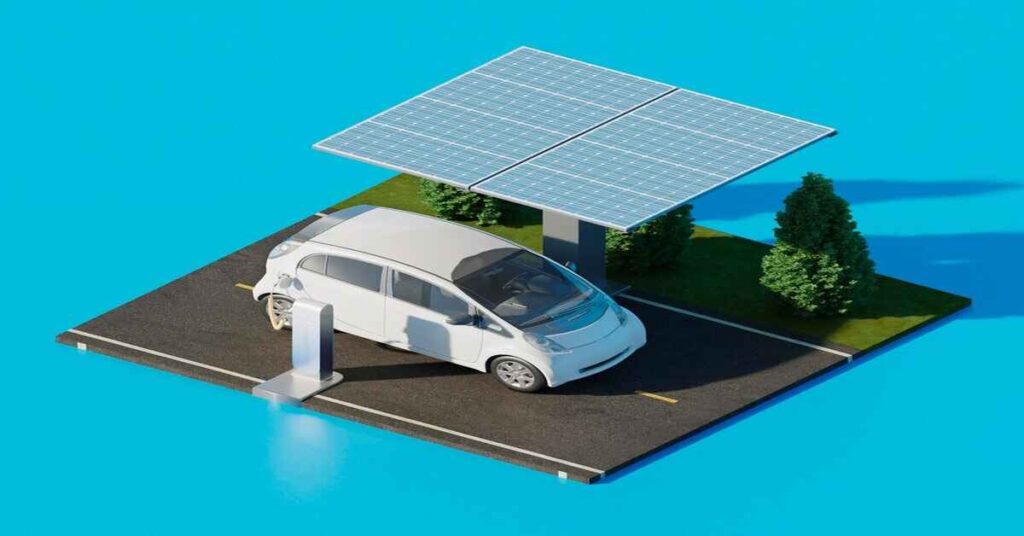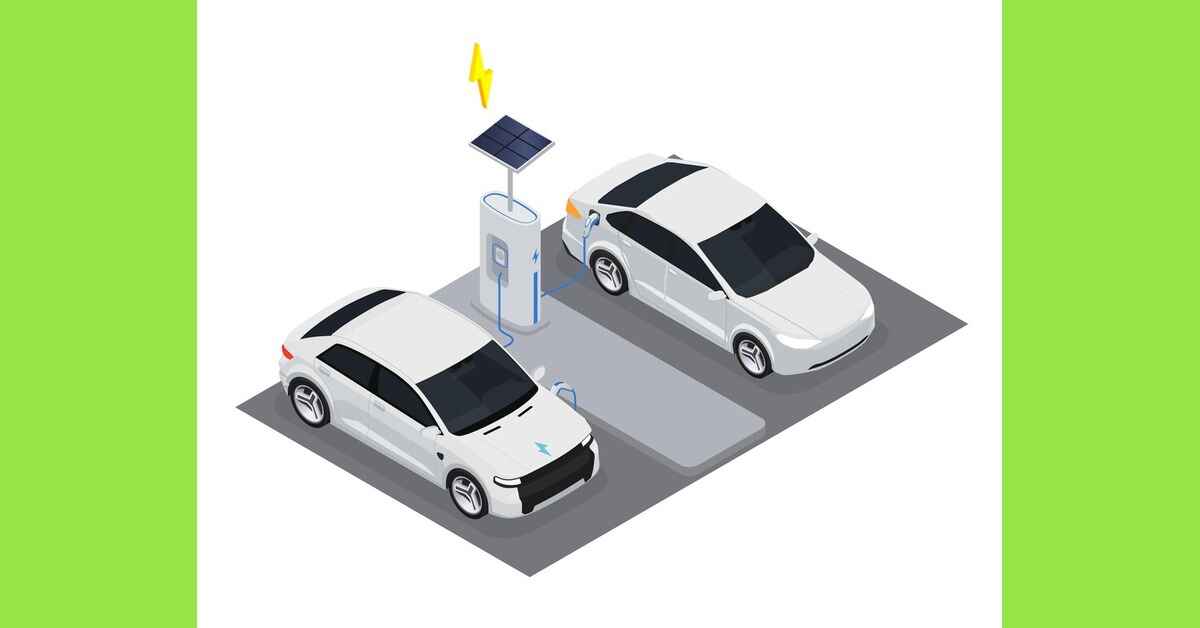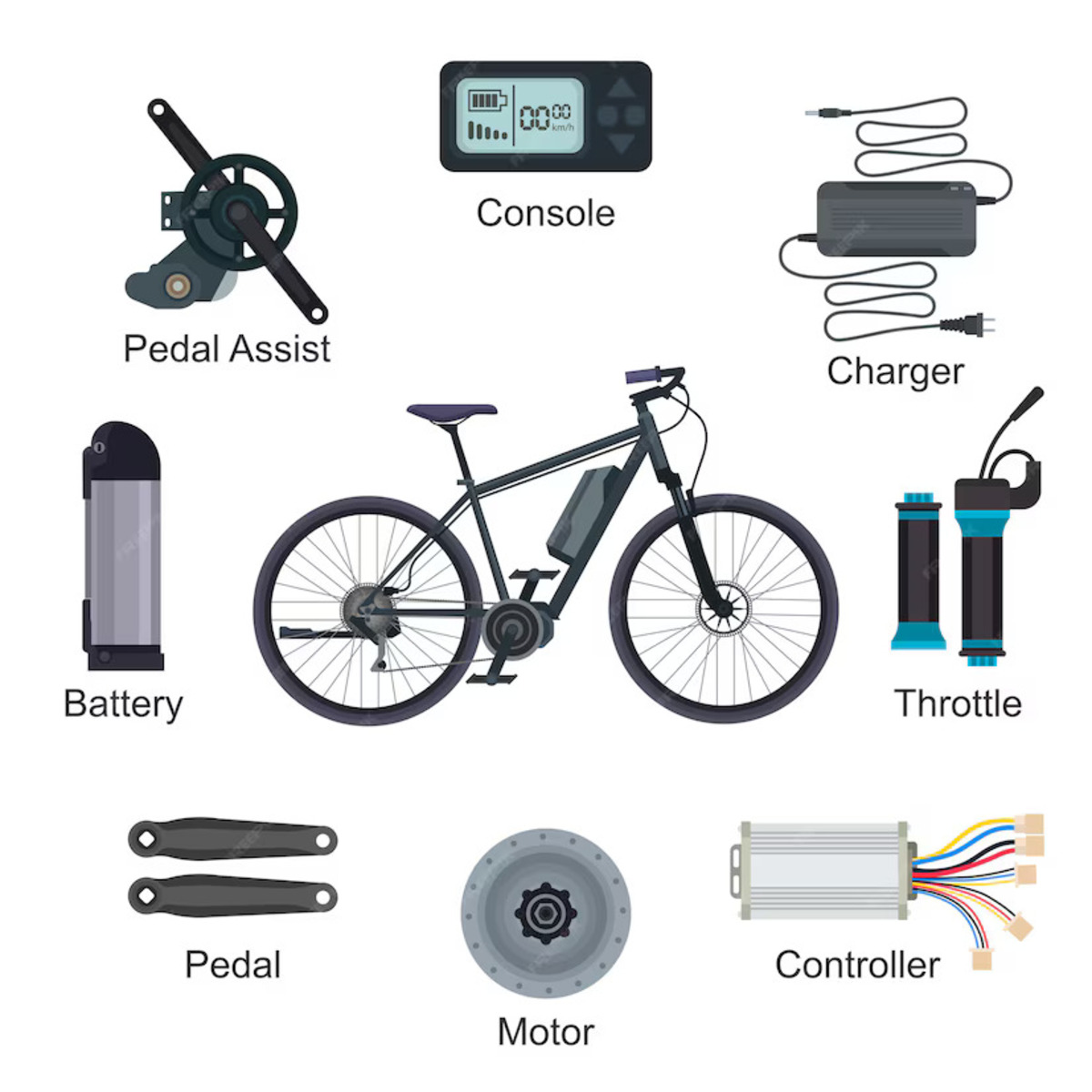Solar EV Charging Stations are an efficient way to power electric vehicles. Combining solar energy with electric vehicle charging not only reduces carbon emissions but also contributes to a more sustainable and resilient energy infrastructure. In this blog we will discuss the following topics:
- What is Solar Energy?
- Benefits of Solar EV Charging Stations
- Government Push to Install Solar EV Charging Stations
- How to Charge an Electric Vehicle with Solar Panel
- Challenges of EV Solar Charging Stations
Also read:
Benefits And Subsidies for Electric Vehicles
10 Reasons Electric Cars Will Be Cheaper
What Is An Electric Vehicle Conversion or Retrofit?
What is Solar Energy?
Solar energy is a type of renewable energy which is derived from the sun’s radiation. The sun constantly emits energy in the form of light and heat, and humans can transform and use this energy in the form of electricity. Now, it is a renewable source of energy that can be used as a substitute for fossil fuel-based vehicles. Electrification of transportation will reduce carbon emission and solar-power charging stations will take to green mobility.
There are basically two methods, such as photovoltaic and solar thermal technology, to transform solar energy into sustainable energy so that it may be further used. Solar cells, the other name is photovoltaic cells, are used to convert sunlight into electricity. Solar cells are made of semiconductor materials such as silicon and when the sunlight hits the solar cells, it excites electron within the material and creates an electric current. Multiple solar cells relate to solar panels and generate electric power.
Solar thermal technology uses different types of thermal system like solar water heaters, solar cookers, and concentrating solar power (CSP). In solar water heaters, sunlight is used to heat water for the use of industry and resident. CSP system lenses to concentrate sunlight into a small area, that will generate high temperatures and produces steam and drive turbine for electricity use.
Benefits of Solar EV Charging Stations

Solar electric vehicle charging stations provide numerous advantages as they contribute to environmental conservation, cost-effectiveness, and sustainability. Below, we will explore the benefits of solar EV charging stations.
Here we have figured out 8 benefits of solar EV charging stations with their explanations:
- Promote Sustainable Transportations
- Cost-effective
- Reduce Load on Grid
- Lower Operating and Maintenance Cost
- Boost the Indian Economy
- Reduce our Dependency on Crude Oil
- Emits No Greenhouse Gas
- Long-Term Stability
Now let us explain the above benefits of solar EV charging stations
1. Promote Sustainable Transportations
India hopes to have 102 million EV by 2030 that needs 2.9 million charging stations to fulfil the demand of consumer. Solar-powered EV charging stations promote sustainable transportation, eco-friendly environment, and reduce greenhouse gas. Combining solar power with electric vehicles result environment friendly transportation system. Solar charging stations have enough energy storage capabilities ensuring electric vehicles can be recharged in emergency situations.
2. Cost-effective
Solar charging stations can be cost-effective solution for EV consumers as they offer many benefits to India’s economy and climate goals. Solar energy is a renewable resource, once it is installed, generating electricity through sun and use it is cheaper than any other sources.
These EV solar charging stations can be set up in remote area where grid power is not easily accessible. A large number of populations of India lives in rural area and it will even promote EV adoption in those areas.
3. Reduce Load on Grid
By generating electricity through the heat of sun, solar charging stations reduces load on the traditional power grid. It is mostly beneficial during the peak hour demand as during the day, energy is stored in batteries and can be used charge them when required.
4. Lower Operating and Maintenance Cost
Once the initial set up cost of solar-powered charging station is covered, their operating and maintenance cost is low compared to traditional EV charging stations. Planting solar-powered charging station is more feasible than charging stations runs from grid’s electricity.
5. Boost the Indian Economy
Manufacturing, installing and maintenance of solar-power charging station requires human so it can create jobs and contribute to boost the Indian economy.
6. Reduce our Dependency on Crude Oil
Solar EV charging stations harness energy from the sun for further use of renewable source of energy and it helps to mitigate climate control. The adoption of EV solar-powered charging stations will reduce our dependency on importing oils and promote energy security.
7. Emits No Greenhouse Gas
During operation, solar power generates no green-house gas that exacerbate the climate, but contribute to environmentally friendly charging solution for electric vehicles. Renewable energy helps to improve water and air quality.
8. Long-Term Stability
Investment in solar power charging station offers long term cost stability. It provides stable cost structure for EV charging over the system’s lifespan. It also develops positive public relations which helps in increasing marketing opportunities. Your commitment towards sustainability can attract environmentally conscious lover and promote it.
The world is moving fasts towards electric vehicle and solar powered electric charging stations can be the best way to charge them. The development of EV charging stations is further incentivised by the government support with continual engagement by private sector and by creating new economic opportunities. India’s charging infrastructure market has reached to its explosive growth by facilitating multiple partnership.
Government Push to Install Solar EV Charging Stations
The government has taken many initiatives for the adoption of EV charging stations. In March 2021, the Ministry of Power issued guidelines for EV charging stations that all public charging stations are required to install solar panels with a capacity of at least 10 percent of the total charging station capacity. Besides it, the government has announced several subsidies and incentives that will be a push for solar-powered charging stations.
On January 22, 2024, Prime Minister Narendra Modi launched the Pradhan Mantri Suryodaya Yojna, and the purpose of this scheme is to provide rooftop solar power systems to one crore households across the country. Under this scheme, the government will provide subsidies for the installation of solar panels, and this scheme help in reducing the electricity bill of houses to benefit poorest to middle-class people.
For more details, you can click here
How to Charge an Electric Vehicle with Solar Panel
To charge your electric vehicle with solar power, first you need to set up a solar photovoltaic system that generates electricity from the sun and later it can be used to charge the electric vehicle. Here is the general guide that you can follow to charge your electric vehicle with solar panel
- Install Solar Panels
- Install an Inverter
- Install an EV Charging Station
- Connect the Solar System to the Charging Station
- Monitor and Maintain the Charging Station
Lets discuss the above points in detail:
1. Install Solar Panels
First you need to install photovoltaic solar power system on your property. You need to choose either a roof or any location which receives a lot of sunlight. The number of panels you need depends on your energy needs and efficiency of the panels.
2. Install an Inverter
You should connect solar panels to an inverter that converts direct current (DC) generated by solar panels into alternating current (AC) electricity, which is required to charge your electric vehicle. An inverter plays crucial role in this conversion and make sure that it is accordant with charging hardware.
3. Install an EV Charging Station
Install an electric vehicle charging station at your home or any preferred location. This charging station manages the whole charging process and ensures that solar power system and vehicle are compatible with each other.
You can setup a battery system too although it is an optional. It stores excess energy that are generated by sonal panels during the day and can be used at night or the time when sun light is low.
4. Connect the Solar System to the Charging Station
An electrician can connect the solar system to the charging system ensures EV is ready to charge with it. The solar energy transferred to charging station and finally charging to your electric vehicle.
5. Monitor and Maintain the Charging Station
During the charging process, you can use monitoring software to keep a track on output produced by solar power and consumption of energy by EV. It will help to understand the complete charging process. You should keep the solar panels clean which would increase its efficiency.
It is foremost to understand that installation process may change according to the requirement of the electric vehicle. You should follow the proper safety requirements during installation process. Recent development in technology has made solar power a most effective and powerful solution to bring it at par with traditional grid.
Challenges of EV Solar Charging Stations
There is no doubt that EV solar charging stations offers several benefits, yet lack of awareness, high upfront cost and lack of charging stations are the biggest concern so, Govt needs to take more initiative to root out the challenges that comes before installing solar EV charging stations
- Limited Awareness of Solar Charging Stations
- Intermittent Energy Generation
- High Initial Cost
- Limited Space
- Energy Storage Challenges
1. Limited Awareness of Solar Charging Stations
Many users may not be aware of the benefits of EV solar charging stations so they may not be interested in adopting it. Raising awareness is crucial to increase the widespread adoption.
2. Intermittent Energy Generation
Solar power generation is highly affected by weather conditions as cloudy weather make solar energy inconsistent, creating fluctuations in charging stations output.
3. High Initial Cost
The upfront cost of installing EV solar charging stations is high so initial high investment is a hurdle for its widespread adoption.
4. Limited Space
Solar panel requires significant space for installation but sometime finding a suitable location with ample sunlight can be an arduous task, especially in urban area.
5. Energy Storage Challenges
Energy storage solutions such as batteries are required to store excess energy, so that it may be used further but these batteries increase the cost and complexity of the charging stations.
Conclusion
To conclude, the renewable energy is a game changer in the world of electric vehicles. They are eco-friendly and offer a green charging stations in place of traditional charging stations. Government should conduct awareness program to provide accurate information about EV solar power. If you want to charge your electric vehicle by solar panel, a few things should be kept in mind such as the size of solar panel, proper availability of sunlight and the type of charge which is used. Using solar panels can be a good option as it makes the environment eco-friendly and saves money too. With the government support, the adoption of solar EV charging stations is expected to increase in the coming year.




